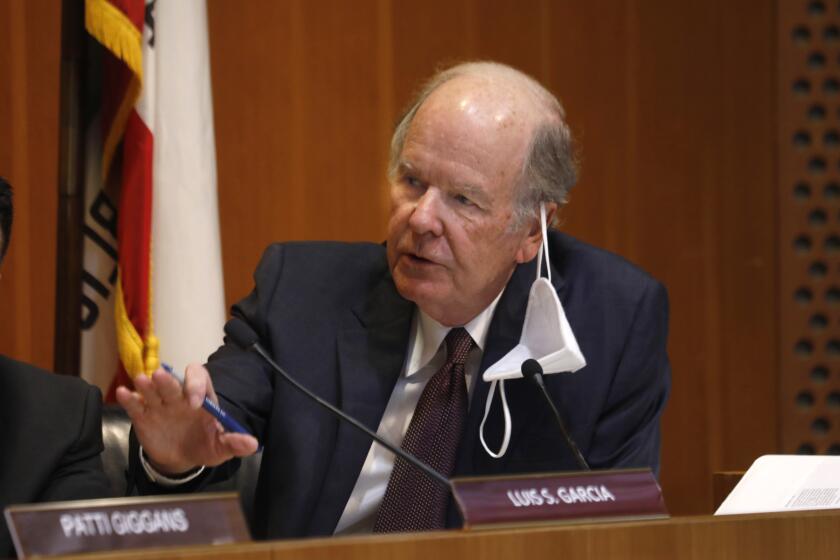Last Chance for a Good Impression
- Share via
SACRAMENTO — If egoism, partisanship and vindictiveness can be kept in check for two more days, this likely will go down as one of the most productive legislative sessions in years.
As lawmakers scurry to adjourn for the year Friday night, packages of bills quickly are being negotiated that are destined for the governor’s desk. Most fit under the umbrella of economic recovery , or stimulus , something legislators and Gov. Pete Wilson pledged recession-anxious Californians last January when the session convened.
Anxious themselves politically, the elected officials now seem on the verge of delivering on their promises. For Wilson, it probably is the last good chance before he faces reelection next year to enhance a record that most Californians do not find very appealing, according to polls.
Actually, most of the recent negotiating has occurred without the governor’s direct involvement, in contrast to his resolute bargaining over the state budget in June. Wilson basically has stepped aside, stuck with his summer agenda--campaigning against illegal immigration--and watched the Legislature follow its own course.
His principal role will be to sign or veto the bills, take some credit and amend his resume.
*
In the legislative halls, one can hardly open a door this week without uncovering a nest of nervous negotiators.
Lobbyists for manufacturers, environmentalists and unions--together with legislators--burned both ends of the Labor Day weekend, negotiating to 2 a.m. Saturday and again until midnight Monday to unexpectedly reach agreement on a major overhaul of the California Environmental Quality Act (CEQA).
Last week, prospects were dim for CEQA reform, No. 2 on the business wish list behind an overhaul of the workers’ compensation system, which was enacted in July. Suddenly, passage of CEQA legislation also seems assured.
The aim is to help developers by simplifying the maze of procedures they must follow to comply with environmental standards--without lowering those standards. The unlikely authors are moderate Sen. Ralph C. Dills (D-Gardena), pro-environment Assemblyman Byron D. Sher (D-Palo Alto) and pro-business Assemblywoman Doris Allen (R-Cypress). “These bills are on their way to the governor,” Sher predicted Wednesday.
Assembly Speaker Willie Brown (D-San Francisco) proudly called the CEQA compromise “the third jewel in the triple crown”--the first two being an on-time budget and workers’ compensation reform.
Additionally, an odd collection of California business concerns, the British government, the Clinton Administration and lawmakers have been wrestling over an awkwardly assembled bill to provide tax breaks for, among other interests, manufacturers and multinational firms.
This is a bitter fight, where bills are being hijacked and amended over the author’s objections. Several bills are being lumped into one to gain political leverage and shortcut regular legislative procedures.
During a Tuesday night negotiating session, a bill was fashioned to provide tax credits for manufacturing equipment and change the so-called unitary tax to benefit multinationals, thus heading off a trade war with the British. It also would offer a capital gains break for small business investors. The principal authors are Brown, who had been pushing solely a sales tax exemption for manufacturing equipment, and an angry Sen. Alfred E. Alquist (D-San Jose), whose unitary tax bill was hijacked in the Assembly.
The betting is that something will pass; just what won’t be decided until Friday night.
Haggling also is taking place over a bill to create a state infrastructure bank that would guarantee loans for local projects, such as transit. This is a bill that could be shelved until next year because political turf is at stake. Will the bank be controlled by the governor or the state treasurer?
Prospects are better for another bill that would provide more loan guarantees for small business development. And passage is greased for bills aimed at helping communities convert military bases into civilian use.
*
Two weeks ago, many legislators privately were saying they were burned out after the budget and workers’ compensation battles and just wanted to leave Sacramento. “Even though there’s more to do, there’ll still be more to do next year,” one observed. Besides, most Democrats were not thrilled with the proposed business tax breaks.
Then they remembered their January promises and looked at next year’s election calendar.
“I can frame great arguments for being against some of these bills,” notes Senate leader David A. Roberti (D-Van Nuys). “But then what do you say when you talk about the business climate? We have to make a more habitable state for business because we are losing jobs.”
More to Read
Get the L.A. Times Politics newsletter
Deeply reported insights into legislation, politics and policy from Sacramento, Washington and beyond. In your inbox twice per week.
You may occasionally receive promotional content from the Los Angeles Times.











